Itinerary
Day itinerary:
With 3,000 years of history, you can’t turn around in Athens without encountering the past. The Acropolis, a UNESCO site, the Plaka, and the Acropolis Museum are must-sees. But leave time if you can to climb Pnyx Hill for photos of the Parthenon at sunset, to buy your own set of Greek komboloi (worry beads), and to explore the metro stations that serve as mini-museums for the relics that are constantly being unearthed.
Oraia (beautiful) is the word Greeks use to describe Nafplion. The town’s old section, on a peninsula jutting into the gulf of Argos, mixes Greek, Venetian, and Turkish architecture; narrow streets, often just broad flights of stone stairs, climb the slopes beneath the walls of Acronafplia. Tree-shaded plazas surround neoclassic buildings. The Palamidi fortress—an elegant display of Venetian might from the early 1700s—guards the town. Nafplion deserves at least a leisurely day of your undivided attention, and you may want to spend several days or a week here and use the city as the base from which to explore the many surrounding ancient sights.
Day itinerary:
This charming seaside town on the Peloponnese is one of the most romantic cities in Greece. Enjoy the medieval old town with narrow cobblestone alleys, and neoclassical mansions with bougainvillea trees adorning the balconies. Take an optional tour to the UNESCO site of Epidaurus or the UNESCO site of Mycenea, ancient ruins including the famous Lion’s Gate. Stroll the Syntagma Square and take in the beauty of the Palamidi Castle with its 999 steps carved from the rocks. The view is breathtaking.
Although the fishing boats still go out in good weather, Mykonos largely makes its living from tourism these days. The summer crowds have turned one of the poorest islands in Greece into one of the richest. Old Mykonians complain that their young, who have inherited stores where their grandfathers once sold eggs or wine, get so much rent that they have lost ambition, and in summer sit around pool bars at night with their friends, and hang out in Athens in winter when island life is less scintillating. Put firmly on the map by Jackie O in the 1960s, Mykonos town—called Hora by the locals—remains the Saint-Tropez of the Greek islands. The scenery is memorable, with its whitewashed streets, Little Venice, the Kato Myli ridge of windmills, and Kastro, the town’s medieval quarter. Its cubical two- or three-story houses and churches, with their red or blue doors and domes and wooden balconies, have been long celebrated as some of the best examples of classic Cycladic architecture. Luckily, the Greek Archaeological Service decided to preserve the town, even when the Mykonians would have preferred to rebuild, and so the Old Town has been impressively preserved. Pink oleander, scarlet hibiscus, and trailing green pepper trees form a contrast amid the dazzling whiteness, whose frequent renewal with whitewash is required by law. Any visitor who has the pleasure of getting lost in its narrow streets (made all the narrower by the many outdoor stone staircases, which maximize housing space in the crowded village) will appreciate how its confusing layout was designed to foil pirates—if it was designed at all. After Mykonos fell under Turkish rule in 1537, the Ottomans allowed the islanders to arm their vessels against pirates, which had a contradictory effect: many of them found that raiding other islands was more profitable than tilling arid land. At the height of Aegean piracy, Mykonos was the principal headquarters of the corsair fleets—the place where pirates met their fellows, found willing women, and filled out their crews. Eventually the illicit activity evolved into a legitimate and thriving trade network. Morning on Mykonos town’s main quay is busy with deliveries, visitors for the Delos boats, lazy breakfasters, and street cleaners dealing with the previous night’s mess. In late morning the cruise-boat people arrive, and the shops are all open. In early afternoon, shaded outdoor tavernas are full of diners eating salads (Mykonos’s produce is mostly imported); music is absent or kept low. In mid- and late afternoon, the town feels sleepy, since so many people are at the beach, on excursions, or sleeping in their air-conditioned rooms; even some tourist shops close for siesta. By sunset, people have come back from the beach, having taken their showers and rested. At night, the atmosphere in Mykonos ramps up. The cruise-boat people are mostly gone, coughing three-wheelers make no deliveries in the narrow streets, and everyone is dressed sexy for summer and starting to shimmy with the scene. Many shops stay open past midnight, the restaurants fill up, and the bars and discos make ice cubes as fast as they can. Ready to dive in? Begin your tour of Mykonos town (Hora) by starting out at its heart: Mando Mavrogenous Square.
Day itinerary:
Wake this morning to the postcard-like scene of Mykonos, the classic Greek isle dotted with hundreds of whitewashed churches and thatch-roofed windmills, in a harbor bobbing with fishing boats and luxurious private yachts. An optional tour including a scenic ferry ride takes you back to the 6th century B.C. to the tiny island of Delos, a UNESCO site and the mythical birthplace of Apollo.
Whilst the busy resort town of Kusadasi offers much in the way of shopping and dining – not to mention a flourishing beach life scene, the real jewel here is Ephesus and the stunning ruined city that really take centre stage. With only 20% of the classical ruins having been excavated, this archaeological wonder has already gained the status as Europe’s most complete classical metropolis. And a metropolis it really is; built in the 10th century BC this UNESCO World Heritage site is nothing short of spectacular. Although regrettably very little remains of the Temple of Artemis (one of the seven wonders of the ancient world), the superb Library of Celsus’ façade is practically intact and it is one of life’s great joys to attend an evening performance in the illuminated ruins once all the tourists have left. The history of the city is fascinating and multi-layered and it is well worth reading up on this beforehand if a visit is planned. Another point of interest for historians would be the house of the Virgin Mary, located on the romantically named Mount Nightingale and just nine kilometres away from Ephesus proper. Legend has it that Mary (along with St. John) spent her final years here, secluded from the rest of the population, spreading Christianity. An edifying experience, even for non-believers. For the less historical minded amongst you, Kusadasi offers plenty in the way of activities. After a stroll through the town, jump in a taxi to Ladies’ Beach (men are allowed), sample a Turkish kebap on one of the many beachfront restaurants and enjoy the clement weather. If you do want to venture further afield, then the crystal clear beaches of Guzelcamli (or the Millipark), the cave of Zeus and the white scalloped natural pools at Pamukkale, known as Cleopatra’s pools, are definitely worth a visit.
Day itinerary:
Few places offer such a rich combination of history and scenic beauty. In Ephesus, one of the greatest outdoor museums in the world, you’ll explore legendary sites steeped in history. Also visit the houses of Bulbul Mountain, where the roof of one forms the terrace of the next. This evening we present our Destination Discovery Event — dinner in the moonlight and a concert near the Celsus Library or on Harbour Street in ancient Ephesus.
For better or worse, it can be difficult to reach Patmos—for many travelers, this lack of access is definitely for the better, since the island retains the air of an unspoiled retreat. Rocky and barren, the small, 34-square-km (21-square-mi) island lies beyond the islands of Kalymnos and Leros, northwest of Kos. Here on a hillside is the Monastery of the Apocalypse, which enshrines the cave where St. John received the Revelation in AD 95. Scattered evidence of Mycenaean presence remains on Patmos, and walls of the classical period indicate the existence of a town near Skala. Most of the island’s approximately 2,800 people live in three villages: Skala, medieval Chora, and the small rural settlement of Kambos. The island is popular among the faithful making pilgrimages to the monastery as well as with vacationing Athenians and a newly growing community of international trendsetters—designers, artists, poets, and “taste gurus” (to quote Vogue’s July 2011 write-up of the island)—who have bought homes in Chora. These stylemeisters followed in the footsteps of Alexandrian John Stefanidis and the English artist Teddy Millington-Drake who, in the early ’60s, set about creating what eventually became hailed as one of the most gorgeous island homes in the world. The word soon spread thanks to their many guests (who included Jacqueline Kennedy Onassis) but, happily, administrators have carefully contained development, and as a result, Patmos retains its charm and natural beauty—even in the busy month of August.
Day itinerary:
This UNESCO World Heritage Site is known worldwide as the sacred island where St. John wrote the Book of Revelation, Patmos is the ideal place for nature lovers with its coastline of sheer cliffs and its volcanic soil. Highlights of Patmos include the Cave of the Apocalypse and the Holy Monastery of the Apocalypse.
Undoubtedly the most extraordinary island in the Aegean, crescent-shape Santorini remains a mandatory stop on the Cycladic tourist route—even if it’s necessary to enjoy the sensational sunsets from Ia, the fascinating excavations, and the dazzling white towns with a million other travelers. Called Kállisti (the “Loveliest”) when first settled, the island has now reverted to its subsequent name of Thira, after the 9th-century-BC Dorian colonizer Thiras. The place is better known, however, these days as Santorini, a name derived from its patroness, St. Irene of Thessaloniki, the Byzantine empress who restored icons to Orthodoxy and died in 802. You can fly conveniently to Santorini, but to enjoy a true Santorini rite of passage, opt instead for the boat trip here, which provides a spectacular introduction. After the boat sails between Sikinos and Ios, your deck-side perch approaches two close islands with a passage between them. The bigger one on the left is Santorini, and the smaller on the right is Thirassia. Passing between them, you see the village of Ia adorning Santorini’s northernmost cliff like a white geometric beehive. You are in the caldera (volcanic crater), one of the world’s truly breathtaking sights: a demilune of cliffs rising 1,100 feet, with the white clusters of the towns of Fira and Ia perched along the top. The bay, once the high center of the island, is 1,300 feet in some places, so deep that when boats dock in Santorini’s shabby little port of Athinios, they do not drop anchor. The encircling cliffs are the ancient rim of a still-active volcano, and you are sailing east across its flooded caldera. On your right are the Burnt isles, the White isle, and other volcanic remnants, all lined up as if some outsize display in a geology museum. Hephaestus’s subterranean fires smolder still—the volcano erupted in 198 BC, about 735, and there was an earthquake in 1956. Indeed, Santorini and its four neighboring islets are the fragmentary remains of a larger landmass that exploded about 1600 BC: the volcano’s core blew sky high, and the sea rushed into the abyss to create the great bay, which measures 10 km by 7 km (6 mi by 4½ mi) and is 1,292 feet deep. The other pieces of the rim, which broke off in later eruptions, are Thirassia, where a few hundred people live, and deserted little Aspronissi (“White isle”). In the center of the bay, black and uninhabited, two cones, the Burnt Isles of Palea Kameni and Nea Kameni, appeared between 1573 and 1925. There has been too much speculation about the identification of Santorini with the mythical Atlantis, mentioned in Egyptian papyri and by Plato (who says it’s in the Atlantic), but myths are hard to pin down. This is not true of old arguments about whether tidal waves from Santorini’s cataclysmic explosion destroyed Minoan civilization on Crete, 113 km (70 mi) away. The latest carbon-dating evidence, which points to a few years before 1600 BC for the eruption, clearly indicates that the Minoans outlasted the eruption by a couple of hundred years, but most probably in a weakened state. In fact, the island still endures hardships: since antiquity, Santorini has depended on rain collected in cisterns for drinking and irrigating—the well water is often brackish—and the serious shortage is alleviated by the importation of water. However, the volcanic soil also yields riches: small, intense tomatoes with tough skins used for tomato paste (good restaurants here serve them); the famous Santorini fava beans, which have a light, fresh taste; barley; wheat; and white-skin eggplants.
Day itinerary:
As our yacht approaches the spectacular cliffs rising from the deep azure sea, you’ll understand the magic of this area, where some say the ruins of Atlantis remain hidden. Visit the village of Oia and see the iconic Santorini blue domes or take a guided tour of Bronze Age excavations at the UNESCO site of Akrotiri. Toast the day with a crisp, cold glass of local Assyrtiko wine and appreciate the magic accessible to small ships like ours.
Monemvasia boasts a varied and colorful history that can be traced to the 8th-century when Greeks fleeing the Slav invasion of Lakonia found refuge here. In its heyday it controlled sea travel between the Levant and European shores. The wall-encircled Lower Town extends along the slopes of a 985-foot-high crag that projects into the sea on the east side of the Peloponnese. For centuries an impressive stronghold, population dwindled as the inhabitants moved to the mainland. But with the beginning of a restoration program aimed to preserve Monemvasia’s heritage, the Lower Town experienced a new lease on life, and people have begun to return. The Upper Town is situated on top of the Rock of Monemvasia. It is reached via a zigzagging, paved lane. An almost impregnable bastion in earlier days, it has been uninhabited for centuries, but still manages to preserve its magnificent appearance. Visitors today can explore the remains of the ancient citadel-castle and visit the church of Hagia Sofia. From the summit there is also a fantastic view of the surrounding area.
Day itinerary:
This Gibraltar-like town tied to the mainland by a single thread of causeway holds treasures that are old even by Mediterranean standards, with town walls and several churches dating to the 12th century. Climb to the upper town for an up-close look at the castle and Agia Sophia, a Byzantine church. Wander the lanes of the lower town lined with Venetian mansions, many of which have been lovingly restored. Savor the sun on a smooth pebble beach.
Day itinerary:
With 3,000 years of history, you can’t turn around in Athens without encountering the past. The Acropolis, a UNESCO site, the Plaka, and the Acropolis Museum are must-sees. But leave time if you can to climb Pnyx Hill for photos of the Parthenon at sunset, to buy your own set of Greek komboloi (worry beads), and to explore the metro stations that serve as mini-museums for the relics that are constantly being unearthed.
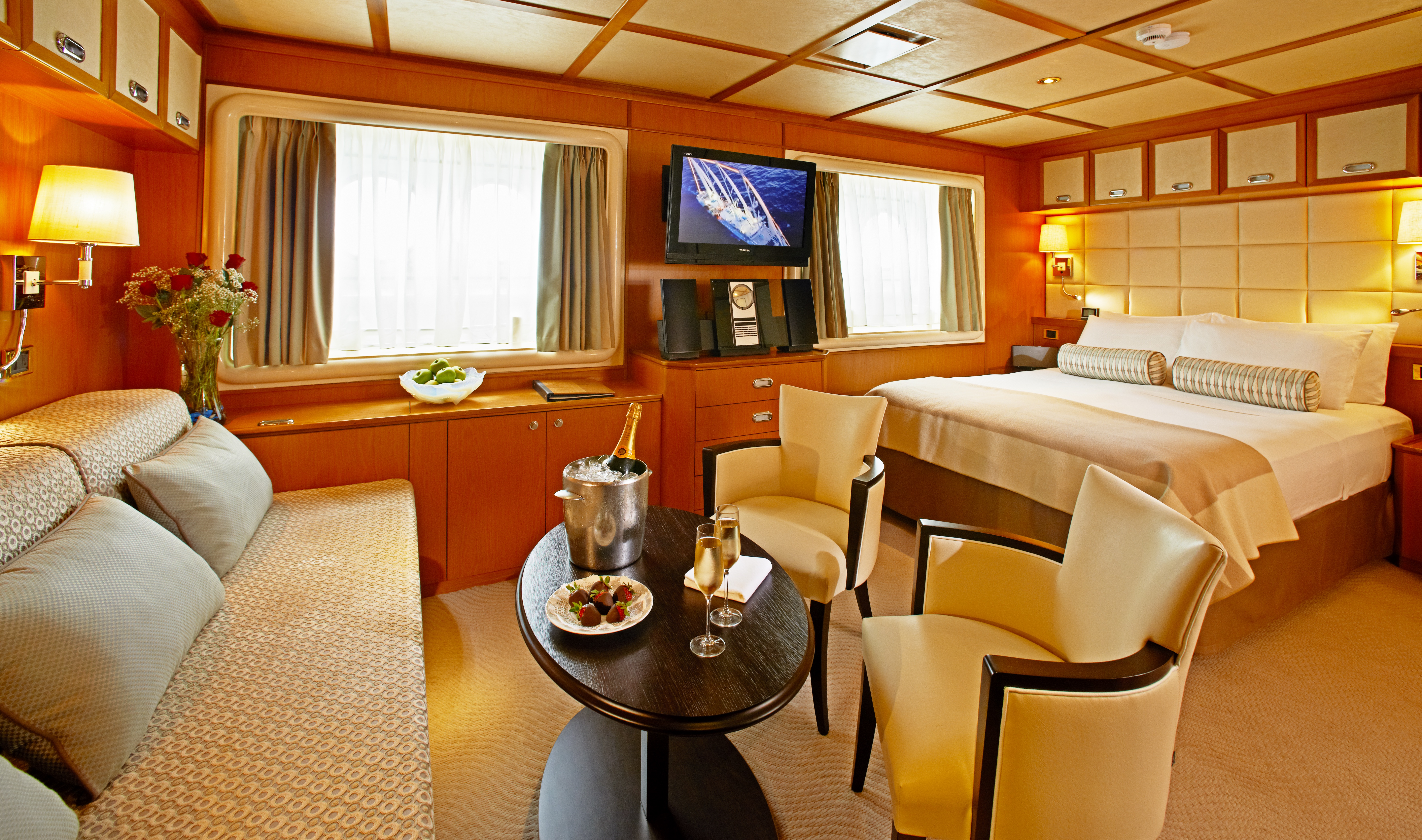
With an expansive 220 square feet, the Owner’s Suite gives you everything offered in a stateroom, plus lots more, including a beautiful sitting area and separate in-room dining space.
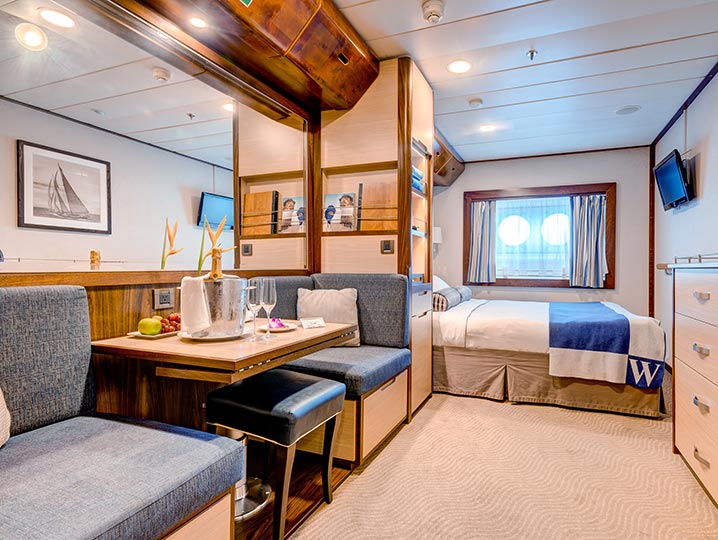
Every inch of your stateroom is designed for comfort. Luxurious Egyptian cotton linens wrap you in pleasant sleepiness as you stretch out in your queen bed (can be separated into twins if you prefer). Your spacious bath features granite counter tops, ample storage, and a roomy shower with massage shower head. L’Occitane® bath products invite you to indulge, while comfy waffle-weave robe and slippers entice you to relax. You’ll find fresh fruit and flowers always waiting for you after a day of sun or sightseeing. And, of course, everything else you need and expect — flat-screen television and DVD, private safe. And always at your fingertips, anything you wish from room service.
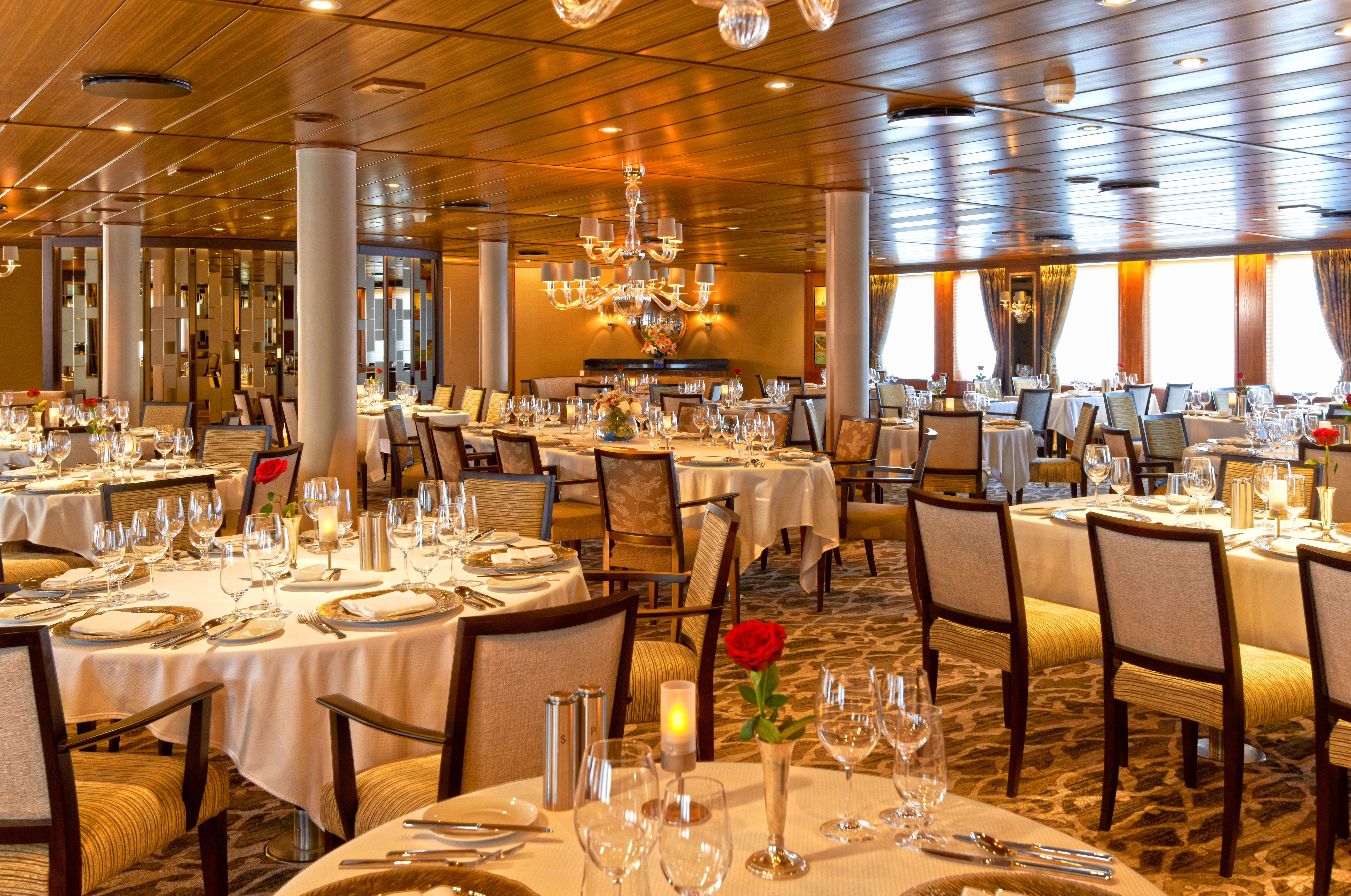
Here, the dining room manager seats you, but where is your decision. There are no pre-assigned tables or first or second seatings. When you dine and with whom are entirely up to you. Seating usually begins at 6:30 p.m. and will be printed in the ship’s daily program. Each delightful dish is prepared exactly to your liking – an exquisite dinner served course-by-course with a fine selection of vintage wines.
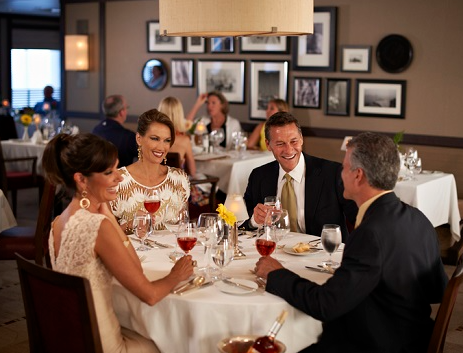
Treat your palate to the French-inspired café cuisine of Stella Bistro, Wind Surf’s alternative restaurant. You’ll find delightfully indulgent desserts and a wonderful array of wines specifically paired to the meal.
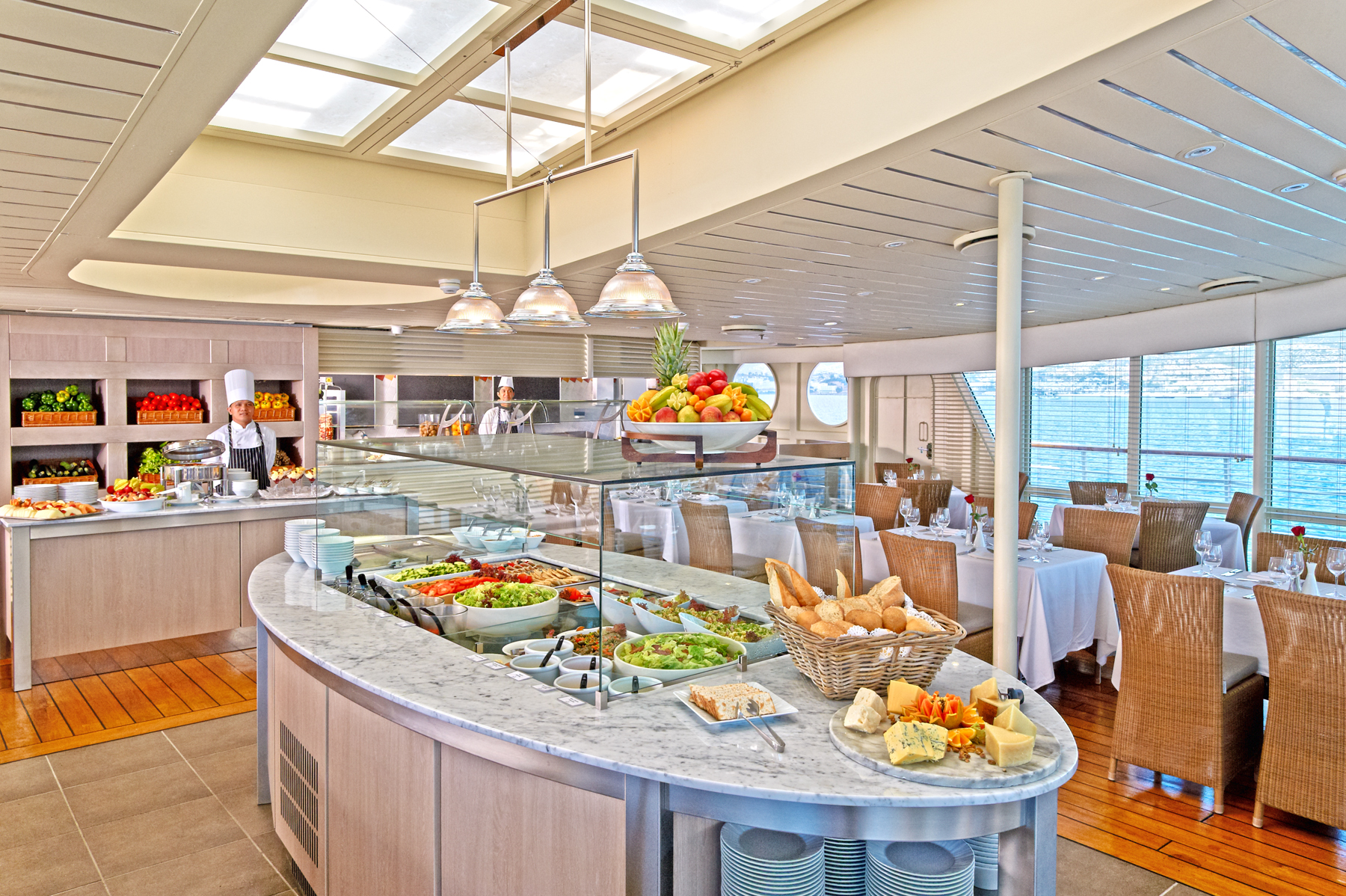
It’s breakfast alfresco, full service or buffet-style, anytime till 9:30 a.m. No need to hurry. Again, the choices are many in Veranda. Choose the sumptuous, seemingly endless buffet. Or, order from the lunch menu between noon and 2:30 p.m.
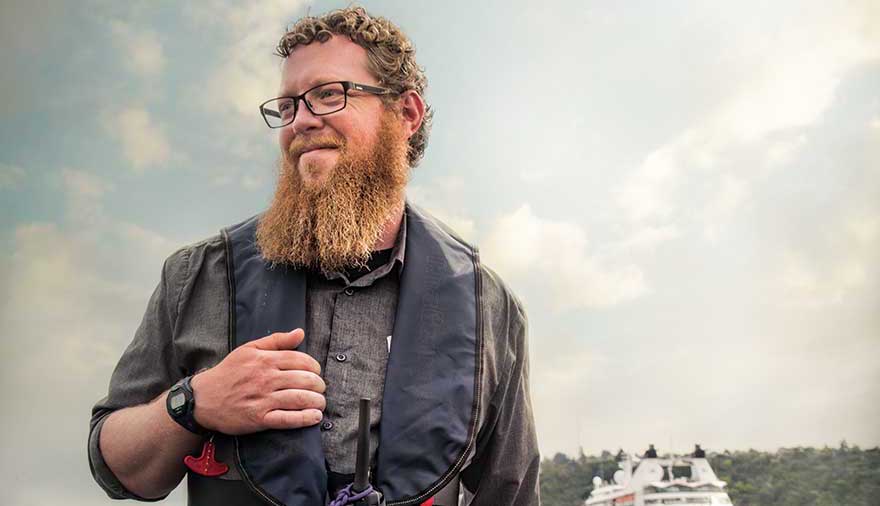
On select Windstar voyages, satisfy your curiosity and enhance your understanding of the local culture by listening to our onboard lecturers. We’ve curated a group of speakers designed to bring you an insider’s perspective on a multitude of intriguing topics. Listen raptly as your voyage becomes more than just a vacation – and a thought-provoking exploration of enchanting lands.
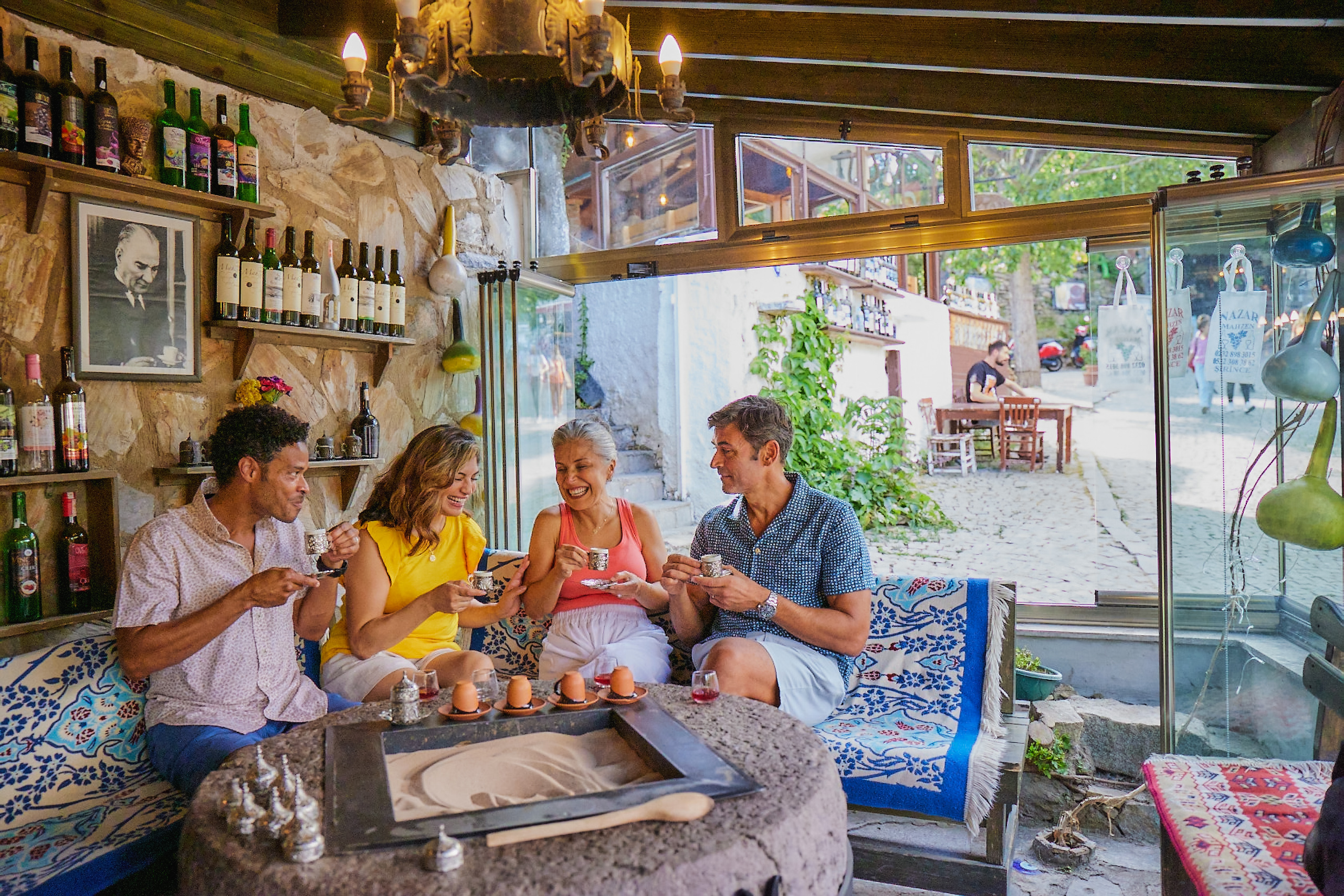
Windstar Signature Expeditions is an immersive program that features 8 expert guides who stay on board throughout the voyage, giving informative talks and taking guests on optional adventures by foot, by kayak, or by Zodiac boat – sometimes launching straight from the ship in remote places like Misty Fjords and Kenai Fjords. It’s Alaska at its most authentic, exciting all your clients’ senses to its magnificence.
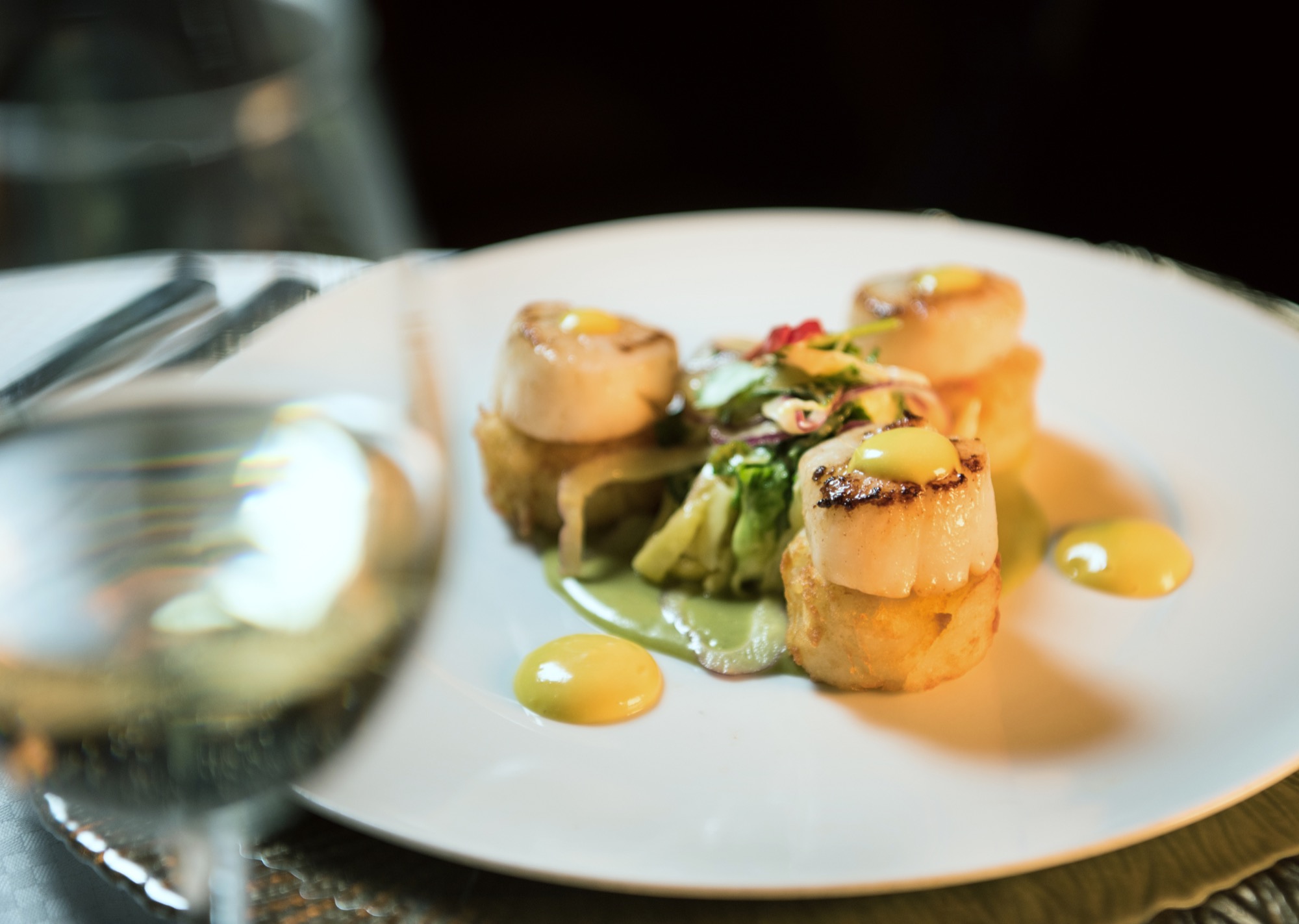
Delight your palette with onboard cooking demonstrations featuring James Beard Foundation chef recipes. From wild striped bass with tomato sage “fondue” to lobster risotto, our Windstar chefs will take your taste buds on a journey through local cuisine. For a special tantalizing treat, join Windstar on one of our voyages in the James Beard Foundation Culinary Cruise Collection, where a James Beard Foundation chef will show you how to elevate your own culinary skills. It’s a taste of enrichment you’ll never forget.
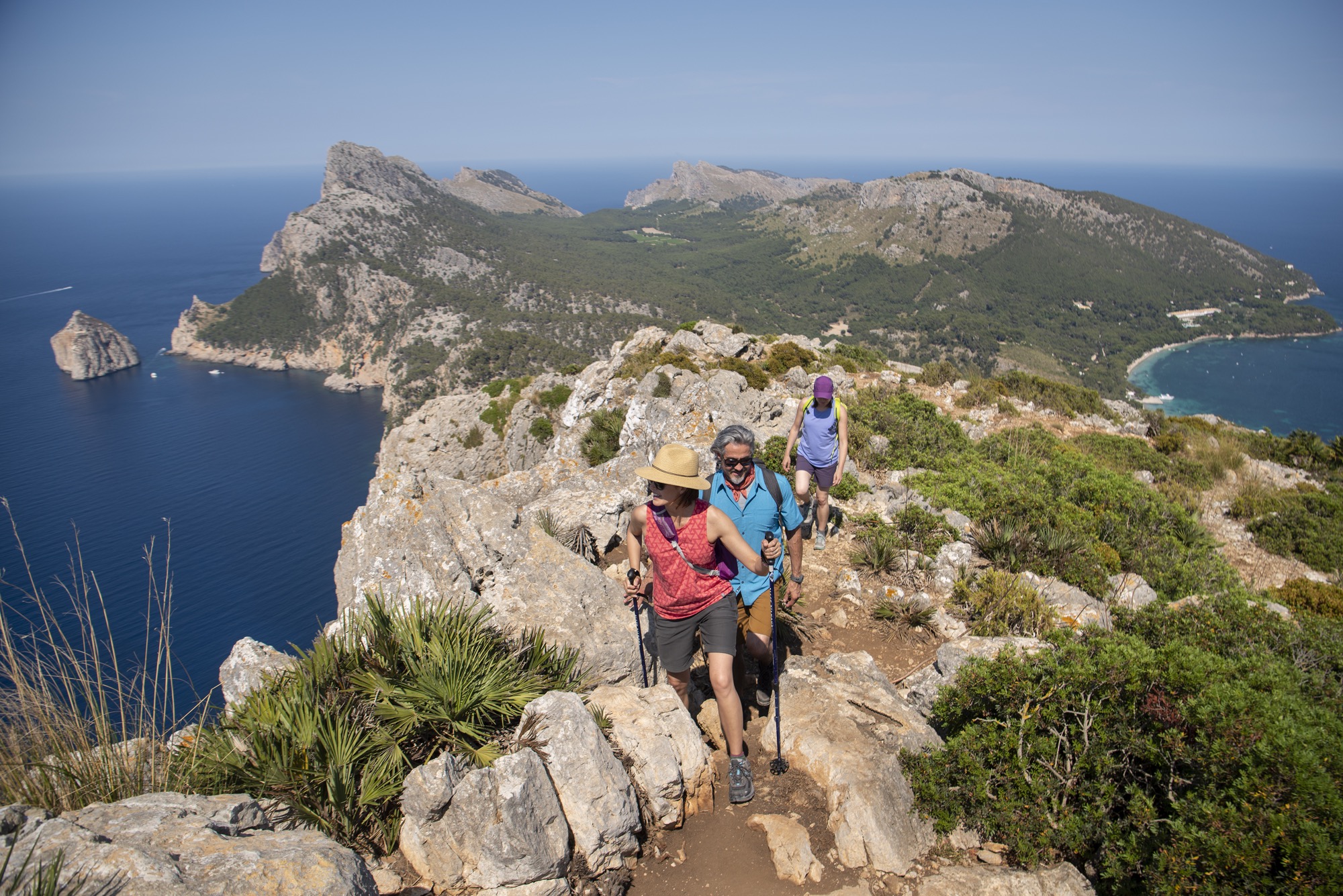
Wine tastings, SCUBA diving, tours with locals and more — Windstar offers a variety of unique excursions that will add more depth and immersion to every day of your journey. Each meticulously planned excursion meets our highest standard of quality in safety and professionalism. Ensure your peace of mind knowing that you’ll always make it back to the yacht on time.
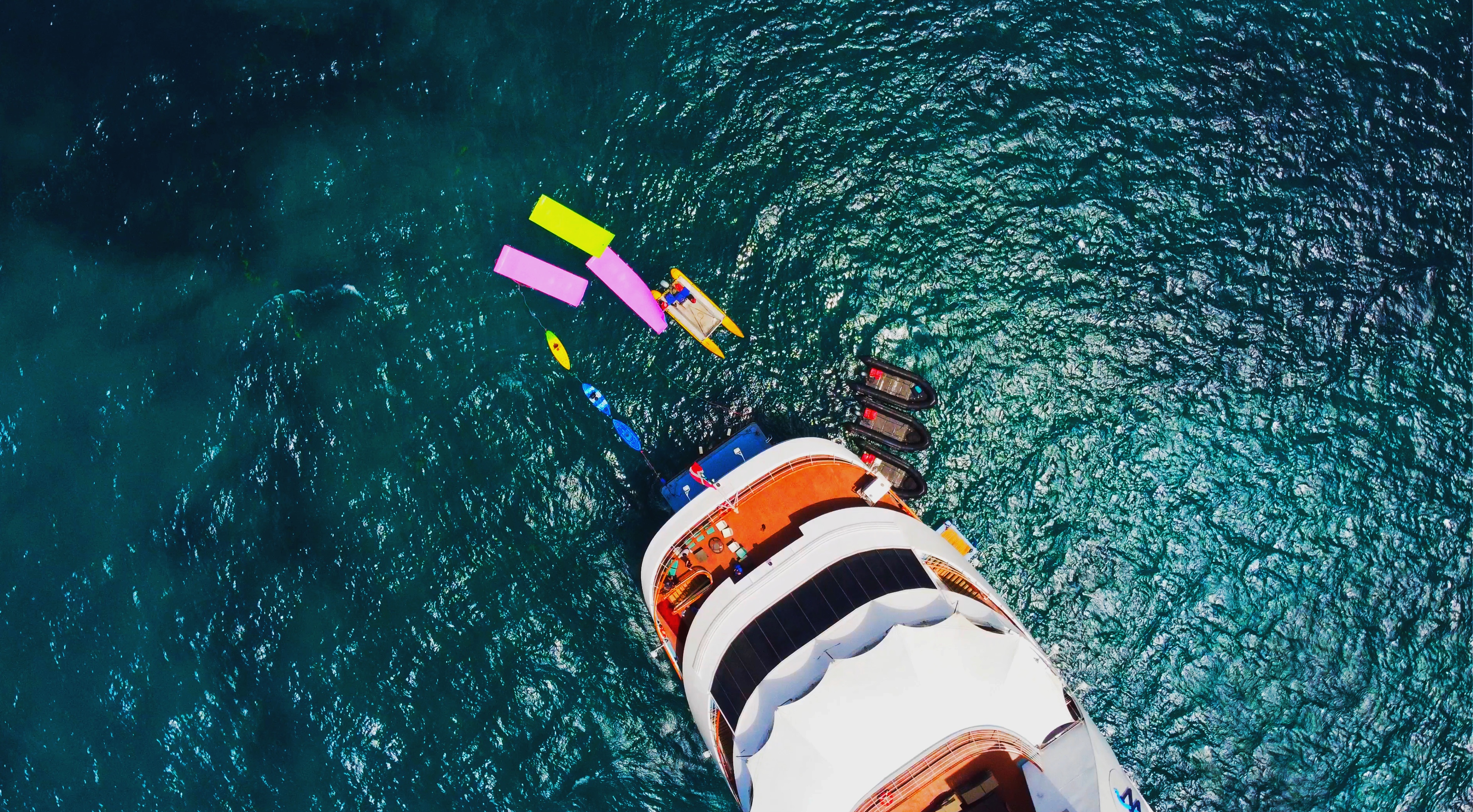
Sailings with Windstar include a lot of special amenities, but one of our most fun (and unique) is the Watersports Platform, which allows guests easy access to the ocean around them.
The platform exists on each of our six yachts and includes unlimited use of all water sports equipment including stand up paddle boarding, kayaking, snorkel equipment, sailing, swimming, water skiing, and windsurfing. If that all sounds like too much work for your vacation, a large foam flotation island is often unfurled into the sea, allowing guests to lounge, casually swim, and take in the view around them.
Use of the Platform is always weather permitting and only takes place in certain ports during each of our journeys in select regions. (check with the crew once on board for more details on where and when the platform will be open).
And don’t forget, there’s NO need to bring snorkel equipment on many Windstar cruises! We provide complimentary masks, fins, and snorkels during your first afternoon on board, so you can take that equipment with you when you’d like to go exploring on your own (or with a designated shore excursion). It even comes in a handy mesh bag. One less thing you have to pack when heading to paradise!
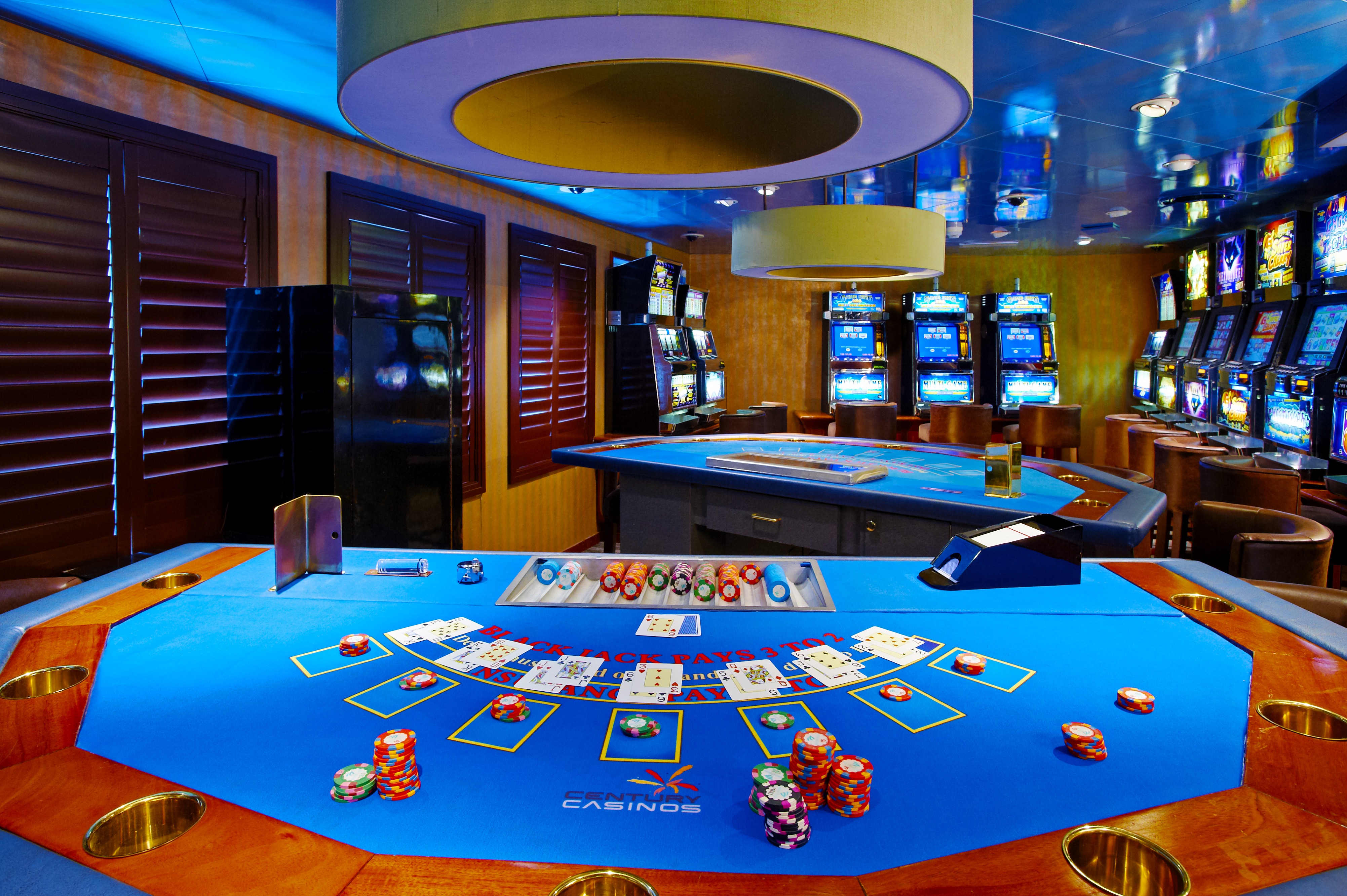
Onboard entertainment facilities include: Sun Deck, Library, Casino, The Lounge, and Signature Shop.
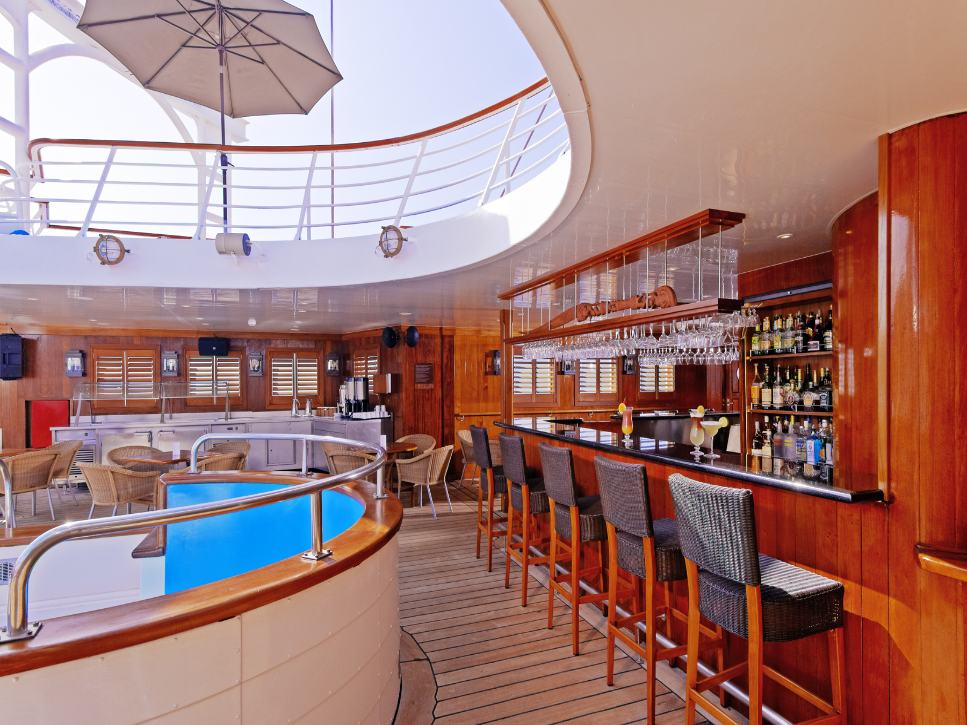
The Pool Bar can be found on Deck Four.
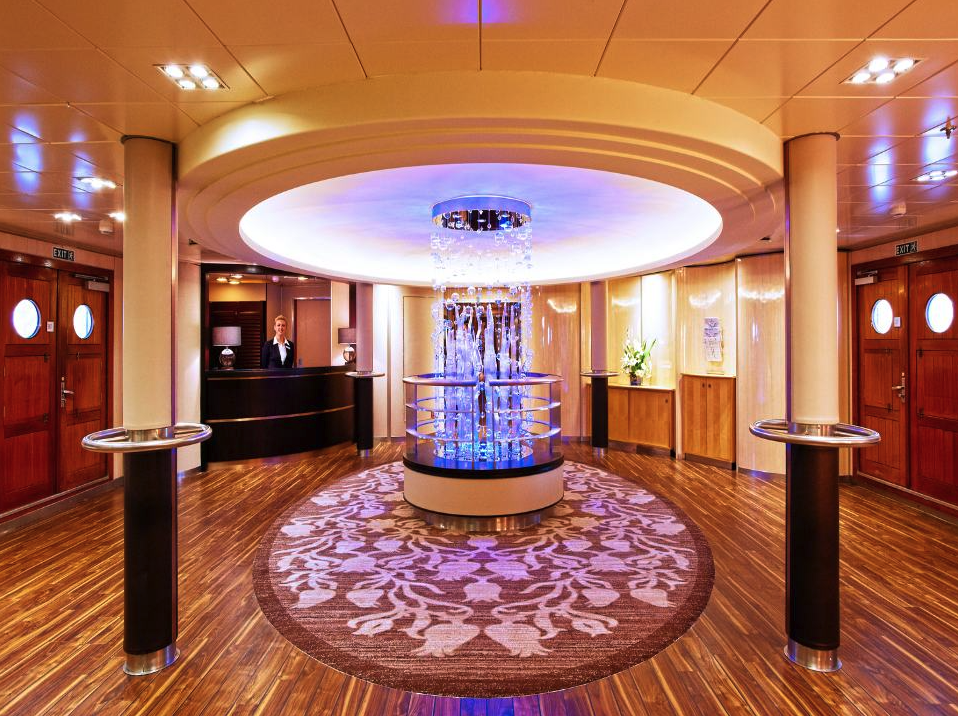
The Reception can be found on Deck Three.
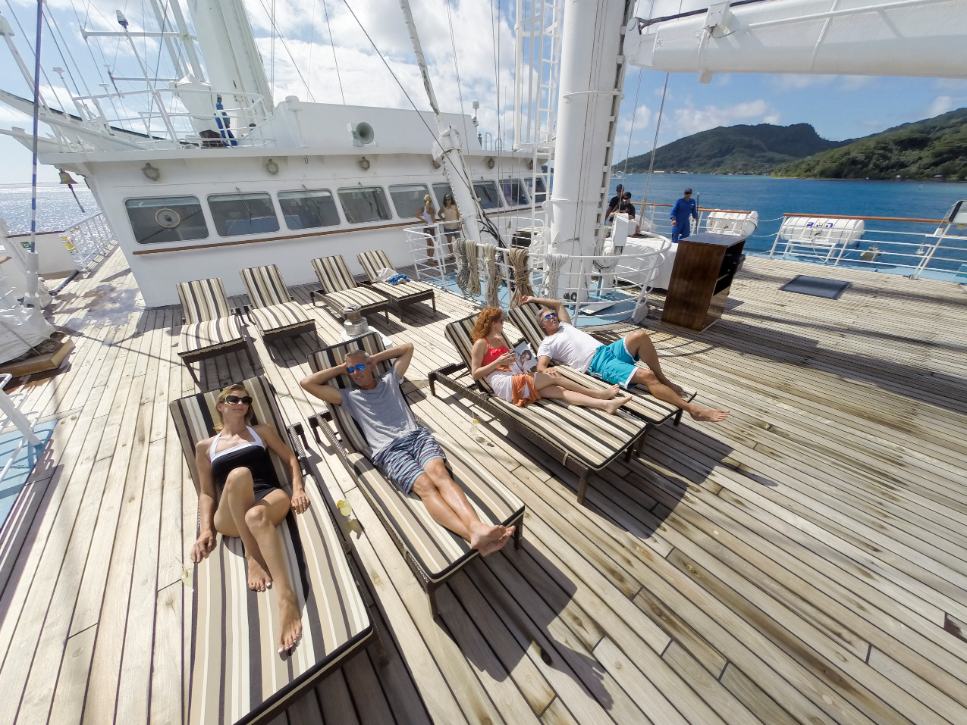
Sun Loungers can be found on Deck Four.
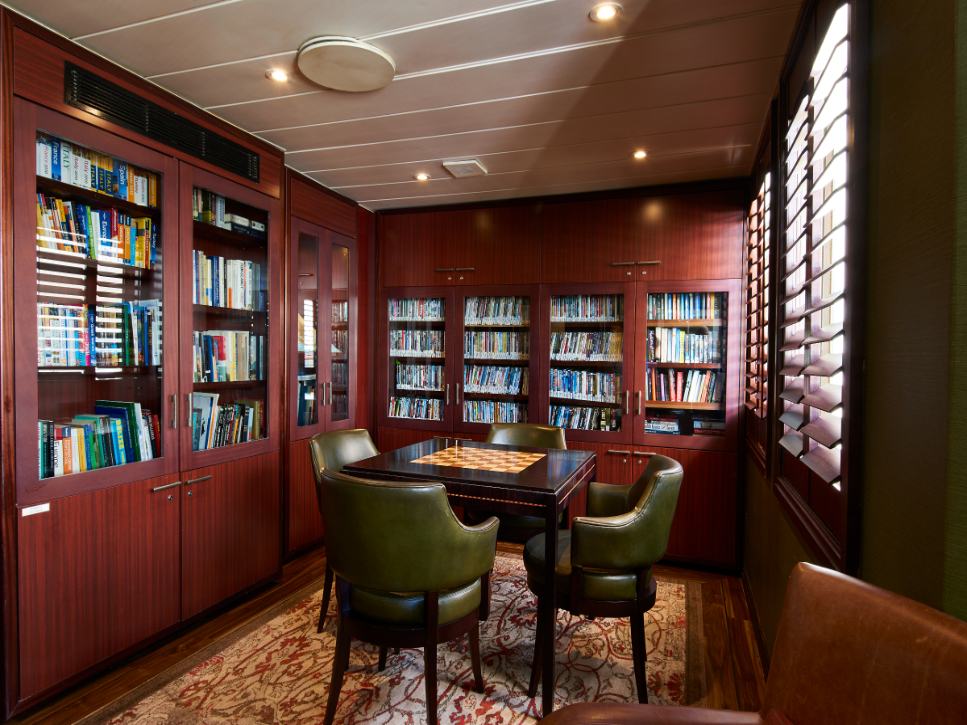
The Library can be found on Deck Three.

The Pool can be found on Deck Four.

Onboard Health & Fitness facilities include a whirlpool, fitness centre, swimming pool and watersports platform.
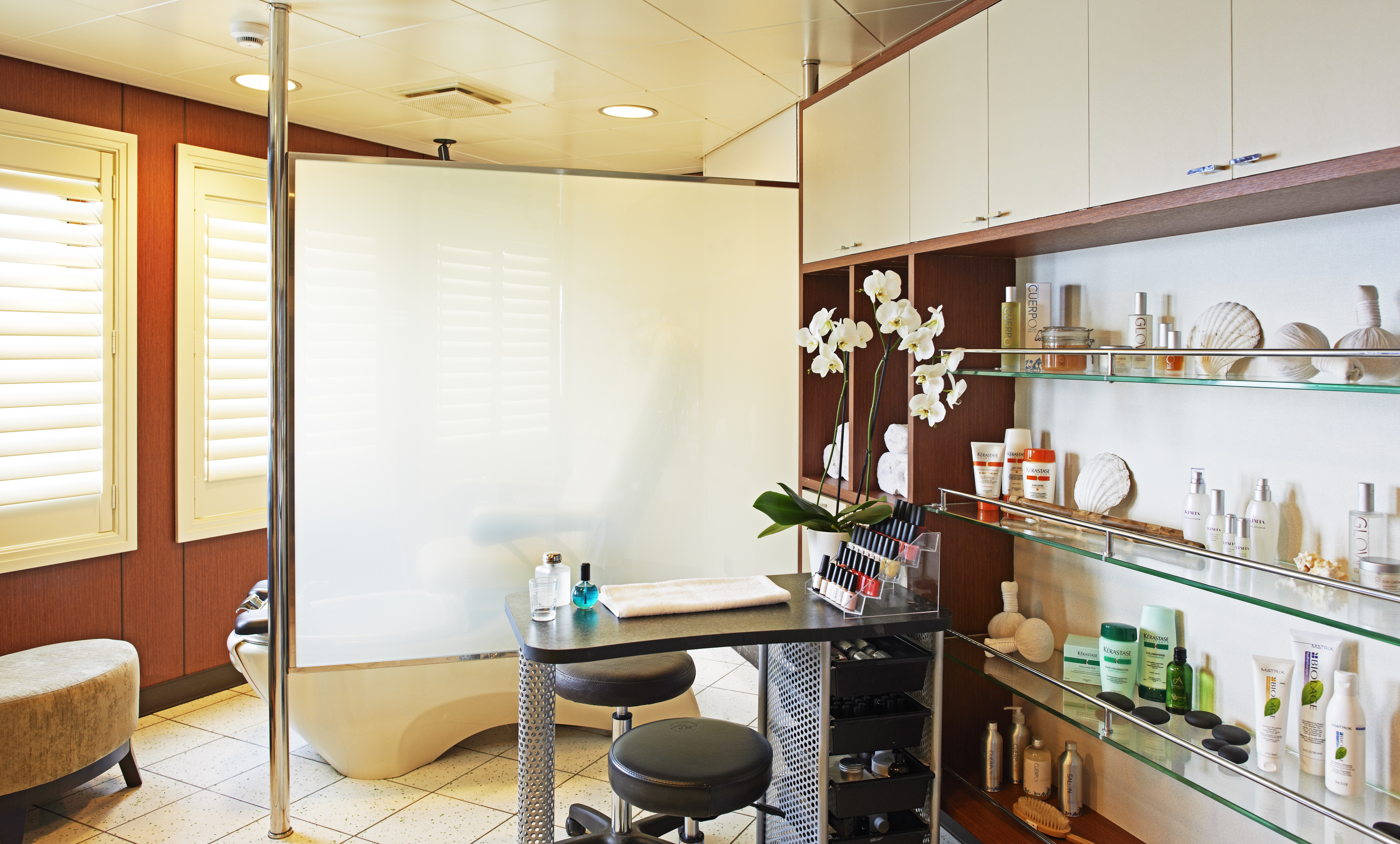
As you enter the hushed atmosphere of the newly-expanded WindSpa, you’ll feel every last care gently melt away. Maybe you’ll try a Hydralift facial or a new colour on your toes. Maybe you’ll surrender to the transformative power of a relaxing massage. With one of the highest crew-to-passenger ratios at sea, you will find yourself in the enviable position of never having to lift a finger.
The crew is happy to do whatever they can to make your time onboard as pampered as possible. Please book spa appointments with the hotel manager once you’ve boarded your yacht.
The less you bring the better. We suggest clothes that are light, cool, and made of natural fabrics like cotton and silk. You may wish to bring warmer clothing (layers are best), if you are traveling on an Ocean Crossing or an autumn Mediterranean cruise.
The Dress Code – from 7 am – 6 pm guests are welcome to dress as they please with the exception of no swimwear in all public lounges and restaurants and no clothing with offensive language or graphics that distract from the comfort and well-being of others. The general shipboard style is elegant, but relaxed including jeans and Bermuda/ walking shorts.
In the evening – after 6 pm when dining in Amphora, Stella Bistro or Cuadro 44 by Anthony Sasso, the dress code is country club-type clothing. For men – nice slacks, polo shirts, button down shirts, shoes other than athletic shoes. Designer denim jeans without rips or holes or are multi-colored are also acceptable. Sport coats are optional. Ties are not needed. For women – nice pants, skirts, tops, casual dresses, sundresses, nice sandals or casual shoes and designer denim dress jeans not ripped or multi-colored or having holes. Blazers are optional.
No assigned seating in Amphora or Veranda restaurants. And what can be more casual than merely signing for onboard purchases? You will feel like this is your ship, your personal yacht. The environment inspires the attitude. Reservations are required for Candles and can be made on board.
For those guests traveling to Alaska, it’s important to wear the right gear. We have partnered with the leading expedition outfitter to offer an online Alaska clothing and accessories service that ships directly to your ship. You’ll find all the right gear for Alaska, packing lists, clothing tips and our limited-edition Alaska inaugural season jacket here..
Passengers under 21 years of age must be accompanied by a parent, guardian or chaperone who is at least 25 years old. One adult chaperone is required for every 5 people under 21. Parents, guardians, and chaperones are responsible for overseeing the onboard conduct of minors. Alcoholic beverages will not be served to guests under age 21.
Windstar Cruises is unable to accommodate children under eight (8) years of age. Guests under 21 years of age must be accompanied by a parent, guardian or chaperone in their stateroom or suite who is at least 25 years old; one adult (age 25 or older) chaperone is required for every five (5) people under 21.
Windstar does not discriminate against persons on the basis of disability. We seek, to the extent feasible, to accommodate the needs of persons with disabilities. There are no elevators on Wind Star and Wind Spirit nor were the ships originally constructed to be wheelchair accessible. As a result, these ships may be unsuitable for people relying solely on wheelchairs. The other yachts are equipped with elevators, but staterooms on Wind Surf are not wheelchair accessible. Also note, there is no elevator access to board the ship. Star Pride, Star Breeze, and Star Legend have modified wheelchair accessible suites available.
Certain ports require the ship to anchor; in this case guests must be ferried into port. Service Dogs are permitted onboard ships if prior arrangements have been made at time of booking. In limited situations where an individual with a disability would be unable to satisfy certain specified safety and other criteria, even when provided with appropriate auxiliary aids and services, we may find it necessary to ask the individual to make alternative travel arrangements. It is essential that Windstar is notified of any special medical, physical or other requirements you may have at the time of booking.
While all non-alcoholic beverages are complimentary, you may enjoy a pre-dinner cocktail under the setting sun or a champagne toast at the evening Sail Away with our beverage packages for wine, beer, cocktails and more. Find the perfect wine pairing with your meal and then end the night sipping scotch as you contemplate the stars.
Topmast Discoveries Beer & Wine Package – $49 per person per day An extensive package of diverse and intriguing wines from traditional European winegrowing terroirs to New World regions. Includes domestic and imported beer and 33 varieties of wine by the glass.
Captain’s Exclusive Beverage Package – $59 per person per day The ultimate beverage package and the perfect way to try new drinks for a bit of added adventure. Includes all domestic and imported beers and 33 varieties of wine/sparkling/champagne by the glass PLUS cordials, liqueurs, apertifs, cocktails and even mini bar items. (Cocktails based on house & select brands)
The All-In Package – From $79 per person per day. Have it all by making it an all-inclusive voyage with unlimited beer, wine & cocktails, unlimited Wi-Fi and gratuities, including the 15% beverage service charge. A convenient bundle that saves time and money, pays most of your expenses upfront and avoids the European VA Tax when pre-purchased. The All-In Package is sold per person and must be purchased up to 7 days prior to departure at $79.
The Topmast, Captain’s Exclusive and $89 All-In Packages are sold per person and must be purchased in advance or during the first 2 days of your cruise and for the full duration of the cruise. Prices for the Topmast and Captain’s Exclusive Packages do not include the standard 15% beverage service charge. Package prices are inclusive of applicable taxes. The minimum drinking age aboard Windstar Cruises is 21 years old.
Laundry service is provided on board at a nominal charge. Dry cleaning is not available. Laundry Service Packages must be added by the first day of the cruise and will be priced by the total number of cruise days. Pricing is inclusive of applicable taxes.
- All meals in all venues at all times, including room service menu available 24 hours
- All non-alcoholic beverages, including cappuccino, espresso, and other specialty non-alcoholic drinks
- Welcome cocktails at reception
- All onboard entertainment
- Unlimited use of Fitness Center
- Unlimited use of all water sports equipment
- Informative nightly port talks and destination briefings
Here at Windstar we are committed to offering our guests healthy food selections. We offer vegetarian selections and lighter fare options, seeking to provide the freshest, top quality foods handled with the utmost care. If you have food allergies or special dietary needs, there are several ways to notify us prior to boarding the ship.
It’s important to let us know about your special request when you book your cruise to help us plan and prepare for your meals. Your travel professional will enter this information in Special Requests. It is then noted on your booking and your ship will be notified, although it will not appear on your invoice or in My Windstar.
Special Request Dietary Needs include:
- Alcohol Free
- Celiac
- Dairy Free
- Diabetic – Diet Controlled
- Diabetic – Insulin Controlled
- Food Allergy
- Gluten Free
- Lactose Intolerant
- Low Carbohydrate
- Low Cholesterol
- Low Protein
- Low Sodium
- Other Dietary
- Sugar Free
- Vegan
- Vegetarian
- Wheat Free Diet
Unfortunately we are unable to accommodate Kosher or Halal meals. If you have specific dietary needs– such as – lactose intolerant requiring almond milk – please complete a Special Requirements Information Form. Return this information via:
1. Mail to Windstar Vacation Planning at 2101 4th Ave., Suite 210, Seattle WA 98121
2. Fax to 206-733-2790
3. Call 866-568-0982 to speak with a Vacation Planner in person
4. Send an email to info@windstarcruises.com
When you embark the ship please feel free to ask to speak with the Executive Chef about your specific request.
If you have any additional questions or concerns please call us during business hours at 866-568-0982.
Smoking or vaping is not permitted in any of the staterooms, suites, or public spaces, including all restaurants and corridors. Smoking and vaping is permitted on the outside decks in designated smoking areas only. Smoking cigars is permitted in a specific designated area on each yacht, however, only sold on board the Cigar Room of Wind Surf.
Windstar Cruises offers full internet capabilities, depending on course and position of the ship, as well as wireless internet service on all ships. Wi-Fi access is possible in most public areas, staterooms, and suites.
Internet Usage Plans
The Email Plan $60
This plan gives you 200 MB of data to use during your cruise. This plan is recommended for people who will be checking email and doing very limited browsing. The estimated minutes range from 15 to 60.
The Surfing Plan $120
This plan gives you 500 MB of data to use for additional browsing and small file transfers (such as posting pictures to a social media site). The estimated minutes range from 90 to 360 (approximately 5 hours).
The Unlimited Plan
Unlimited Internet Package
- 7 Day Cost $250
- 8 Day Cost $280
- 9 Day Cost $315
- 10 Day Cost $350
- 11 Day Cost $385
- 14 Day Cost $490
- 15 Day Cost $525


- Bridge
- Veranda/Candles
- Pool/Pool Bar/Whirlpool

- Amphora Restaurant
- Star Boutique
- Reception
- Library
- WindSpa
- Lounge
- Yacht Club Café

- Watersports Platform
- Fitness Centre
- Category A Cabins
- Category AX Deluxe Cabins

- Owner’s Suite
- Category B Cabins
- Category BX Deluxe Cabins

